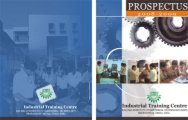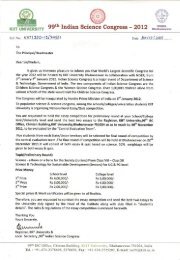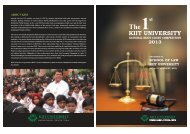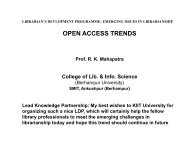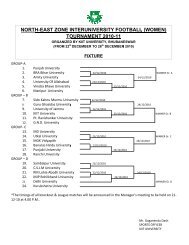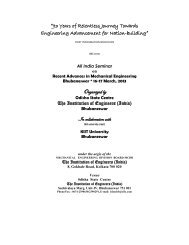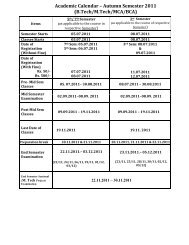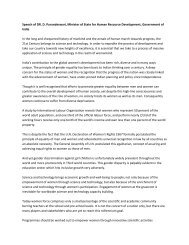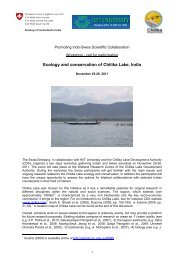PANEL ORGAN - KIIT University
PANEL ORGAN - KIIT University
PANEL ORGAN - KIIT University
Create successful ePaper yourself
Turn your PDF publications into a flip-book with our unique Google optimized e-Paper software.
PAPER PRESENTERS<br />
NAGAR, Deeksha, Folklorist/Independent Researcher, Amrit Pratibha, 5/530 Vikas Nagar,<br />
Lucknow-226022, UP, India, E-mail: <br />
Creativity, Performance and Culture Change, Understanding Children’s World through<br />
Wedding of the Doll Role-Play<br />
This paper will highlight the importance and complexity of doing research on children’s<br />
role-play by examining a popular Indian children’s game called the Wedding of the Doll.<br />
This theme offers a potent framework for analyzing the social, cultural, and economic<br />
relationships of children as articulated in their real life and make-believe worlds. It also<br />
reveals an active inter-generational dialogue because children must consult and seek<br />
assistance from adults to teach about rituals and traditions to accurately perform the<br />
wedding of their dolls. Decades ago, children, especially girls learned about all the<br />
complex caste-based rituals and specific tasks connected with the weddings by planning<br />
and carrying out the wedding of their dolls. My presentation will show how the Wedding of<br />
the Doll game has changed over time. My conclusions will illustrate some new theoretical and<br />
methodological approaches to the study of children’s play and open new vistas to understand<br />
children’s worldviews.<br />
REMORINI*, Carolina, and Micaela Rende**, 46 1344, LA PLATA. CP. 1900, BUENOS AIRES,<br />
National <strong>University</strong> of La Plata, Argentina, E-mail: /<br />
<br />
Play and Child Development: Some Considerations from an Ethnographic Research in<br />
Two Rural Argentinean Communities<br />
*My conclusion will illuminate notions connected with childhood in non-western society –<br />
how a child must be and how should they conform to their gender-roles to develop into<br />
adults. It will illustrate ways in which children learn through play and by participating in<br />
every-day life. The examination of children’s everyday life will demonstrate that children<br />
need experiences, activities and knowledge that provides them with opportunities to<br />
become part of the community.<br />
**We present the preliminary results of an ongoing ethnographic research on child rearing<br />
practices and child development among two rural Argentinean populations: an indigenous<br />
population (Mbya Guarani) located in Misiones Province (northeast rainforest) and a Creole<br />
population (Molinos) located in the highlands and semiarid areas in the northwest (Salta<br />
Province).<br />
From a methodological point of view we use different observation techniques and<br />
photographs and videotapes as complementary recording devices. We also interview<br />
caregivers about local authorities related to child rearing, growth and development. We<br />
are working on a model for observation and recording information about child rearing<br />
practices at the domestic level that includes a section on play and games. The used<br />
method facilitates the recognition of ecological factors characterizing children's play and<br />
also the comparison of both communities. In relation to the theme of this panel we will try<br />
to point out how this research can contribute to an interdisciplinary study of play and to<br />
some sub-disciplines in anthropology and ethnology.<br />
<strong>PANEL</strong>-06(A): ETHNOGRAPHY WITH CHILDREN AND ADOLESCENTS: A COMPARATIVE<br />
ANALYSIS ACROSS STUDIES AND CONTEXTS<br />
26 th November, 2012 Time: 14.00-16.30hrs Hall No.:<br />
<strong>PANEL</strong> <strong>ORGAN</strong>IZER



